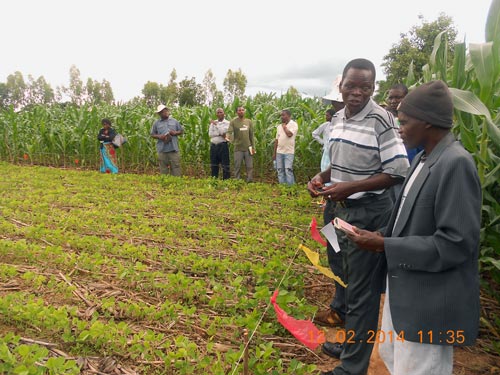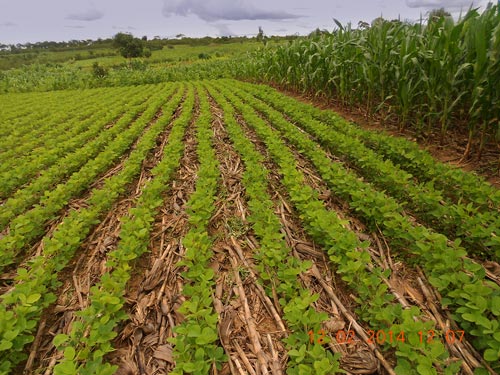By Isaiah Nyagumbo/CIMMYT
Starting a personal conservation agriculture plot and providing training via group theater are some of the tactics an extension development officer in Malawi is using to reach farmers.
Fredrerick Lukhere, the local extension development officer for the Mtuthama Extension Planning Area, has led by example as part of the Sustainable Intensification of Maize-Legume Systems in Eastern and Southern Africa (SIMLESA) project, which is funded by the Australian Centre for International Agricultural Research. A SIMLESA team visited fields in the Kasungu district on 12 February. The team was led by Isaiah Nyagumbo, SIMLESA Southern Africa objective 2 coordinator, and included Gift Mashango, program manager; Jefias Mataruse, research assistant; Cyprian Mwale, national coordinator; Donwell Kamalongo, national objective 2 coordinator; Keneth Chaula, assistant chief agricultural extension officer; and others from the local district office.

More than 60 farmers, including 42 men and 20 women, participated in the tour. Initiated in 2010, SIMLESA activities in Malawi’s Kasungu District are in their fourth season. The project aims to improve the food security and incomes of 650,000 households in eastern and southern Africa within 10 years. Activities also aim to increase productivity by 30 percent and reduce downside risk by 30 percent through use of improved maize and legume varieties and conservation agriculture-based sustainable intensification technologies.
Lukhere has promoted SIMLESA activities using innovative techniques. He reinforces innovation platforms and partnerships founded on the Area Stakeholder Panel, a local community-based institution. He strengthens partnerships with local NGOs such as CADECOM and Total Land Care, subcontracted by SIMLESA to scale out sustainable intensification technologies. He has single-handedly trained NGO staff on how to set up and implement outscaling activities using SIMLESA’s outscaling model involving maizelegume (soybean) rotations.

Lukhere has also ensured the success of core exploratory trials, which were established in 2010 with six farmers in the area. The trials provide a learning platform and are also a source of research data. To increase farmer confidence in the technologies tested, Lukhere set up his own conservation agriculture plot planted with maize in 2012 and has increased the area to 0.5 hectares. The healthy and well-managed maize crop stands as a testimony to Luhkere’s efforts. He also runs a small drama group that trains farmers on SIMLESA technologies and performs to visitors and farmers during field days.
As a result of Luhkere’s efforts, at least 37 farmers are hosting outscaling trials; 84 follower or volunteer farmers are using these technologies without any support; and another 140 farmers are working through CADECOM in the surrounding extension planning areas. Total LandCare also supports farmers by providing herbicides and loans and hosts SIMLESA trials in neighboring extension planning areas.
 Innovations
Innovations